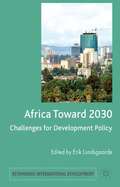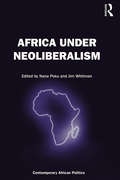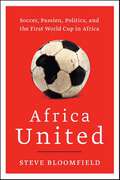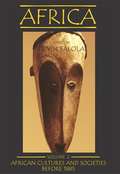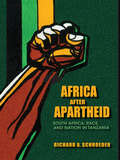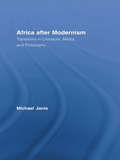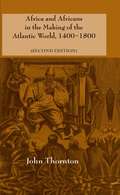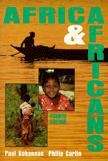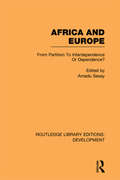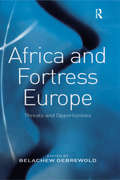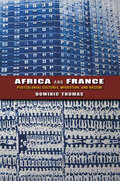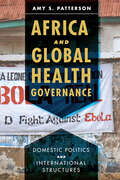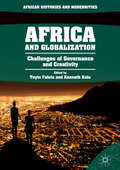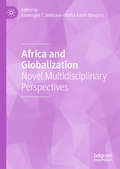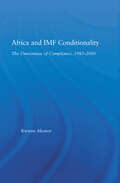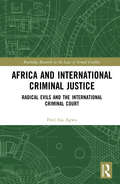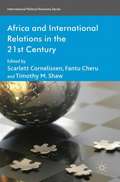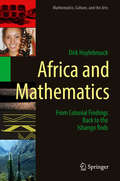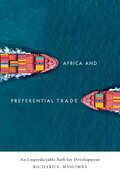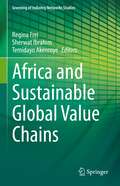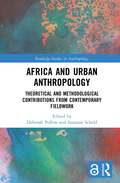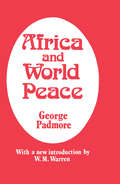- Table View
- List View
Africa Toward 2030
by Erik LundsgaardeWith the deadline of the Millennium Development Goals approaching, governments are considering the main elements for a global development policy reference system after 2015. Adapting insights from the scenario analysis tradition, the contributors identify six major underlying causes of change and key uncertainties affecting Africa's development prospects. The drivers of change considered vital in shaping Africa's future include demography, climate change, technology and innovation, domestic political development, new actors in international development, and global governance. The book outlines several generalized scenarios for the continent's future and discusses the implications of the changing African development context for the priorities and organization of European development cooperation.
Africa Under Neoliberalism: A Century Of Struggle And Quest For Legitimacy (Contemporary African Politics)
by Nana Poku Jim WhitmanThe period since the 1980s has seen sustained pressure on Africa’s political elite to anchor the continent’s development strategies in neoliberalism in exchange for vitally needed development assistance. Rafts of policies and programmes have come to underpin the relationship between continental governments and the donor communities of the West and particularly their institutions of global governance – the International Financial Institutions. Over time, these policies and programmes have sought to transform the authority and capacity of the state to effect social, political and economic change, while opening up the domestic space for transnational capital and ideas. The outcome is a continent now more open to international capital, export-oriented and liberal in its political governance. Has neoliberalism finally arrested under development in Africa? Bringing together leading researchers and analysts to examine key questions from a multidisciplinary perspective, this book involves a fundamental departure from orthodox analysis which often predicates colonialism as the referent object. Here, three decades of neoliberalism with its complex social and economic philosophy are given primacy. With the changed focus, an elucidation of the relationship between global development and local changes is examined through a myriad of pressing contemporary issues to offer a critical multi-disciplinary appraisal of challenge and change in Africa over the past three decades.
Africa United: Soccer, Passion, Politics, and the First World Cup in Africa
by Steve BloomfieldAfrica United is the story of modern day Africa told through its soccer. Travelling across thirteen countries, from Cairo to the Cape, Steve Bloomfield, the former Africa Correspondent for The Independent, meets players and fans, politicians and rebel leaders, discovering the role that soccer has played in shaping the continent. This wide-ranging and incisive book investigates Africa’s love of soccer, its increasing global influence, the build-up to the 2010 World Cup itself and the social and political backdrop to the greatest show on earth.
Africa Volume 2: African Cultures and Societies Before 1885
by Toyin FalolaAfrica: Volume 2 adopts a new perspective on African history and culture, surveying the wide array of societies and states that have existed on the African continent and introducing readers to the diversity of African cultural expressions.
Africa after Apartheid: South Africa, Race, and Nation in Tanzania
by Richard A. SchroederTracing the expansion of South African business into other areas of Africa in the years after apartheid, Richard A. Schroeder explores why South Africans have not always made themselves welcome guests abroad. By looking at investments in Tanzania, a frontline state in the fight for liberation, Schroeder focuses on the encounter between white South Africans and Tanzanians and the cultural, social, and economic controversies that have emerged as South African firms assume control of local assets. Africa after Apartheid affords a penetrating look at the unexpected results of the expansion of African business opportunities following the demise of apartheid
Africa after Modernism: Transitions in Literature, Media, and Philosophy (Routledge Studies in Cultural History)
by Michael JanisAfrica after Modernism traces shifts in perspectives on African culture, arts, and philosophy from the conflict with European modernist interventions in the climate of colonialist aggression to present identitarian positions in the climate of globalism, multiculturalism, and mass media. By focusing on what may be called deconstructive moments in twentieth-century Africanist thought – on intellectual landmarks, revolutionary ideas, crises of consciousness, literary and philosophical debates – this study looks at African modernity and modernism from critical postcolonial perspectives. An effort to sketch contemporary frameworks of global intersubjective relations reflecting African cultures and concerns must resist taking modernism as a term of African periodization, or master-narrative, but as a constellation of discursive and subjective forms that obtains upon the present moment in African literature, philosophy, and cultural history. Africa after Modernism argues for a philosophical consciousness and pan-African multiculturalist ethos that operate, after the deconstruction of Eurocentrism, beyond self/other paradigms of exoticism or West/Africa political ideologies, in dialogue with postcolonial approaches to cultural reciprocity.
Africa and Africans in the Making of the Atlantic World, 1400-1800
by Edmund Burke Michael Adas Philip D. Curtin John ThorntonThis 1998 book explores Africa's involvement in the Atlantic world from the fifteenth century to the eighteenth century. It focuses especially on the causes and consequences of the slave trade, in Africa, in Europe, and in the New World. African institutions, political events, and economic structures shaped Africa's voluntary involvement in the Atlantic arena before 1680. Africa's economic and military strength gave African elites the capacity to determine how trade with Europe developed. Thornton examines the dynamics of colonization which made slaves so necessary to European colonizers, and he explains why African slaves were placed in roles of central significance. Estate structure and demography affected the capacity of slaves to form a self-sustaining society and behave as cultural actors, transferring and transforming African culture in the New World.
Africa and Africans in the making of the Atlantic world, 1400-1800
by John ThorntonThis book explores Africa's involvement in the Atlantic world from the fifteenth through the eighteenth centuries. It focuses especially on the causes and consequences of the slave trade, in Africa, in Europe, and in the New World. Prior to 1680, Africa's economic and military strength enabled African elites to determine how trade with Europe developed. Thornton examines the dynamics that made slaves so necessary to European colonizers. He explains why African slaves were placed in significant roles. Estate structure and demography affected the capacity of slaves to form a self-sustaining society and behave as cultural actors. This second edition contains a new chapter on eighteenth century developments.
Africa and Africans, 4th Edition
by Paul Bohannan Philip CurtinAfrica and Africans keeps a watchful eye on what has happened in Africa and on what has happened in the rest of the world that shapes how people look at Africa. The world's perception of Africa is an entanglement of myth and reality--both reflecting and changing with the times. This highly informative yet concise volume, written by two authors intimately familiar with Africa, presents the facts about African society--past and present. Readers wishing to explore Africa's historical events and rich traditions will discover that Africans want to keep what they value in their old way of life as they find themselves in an emerging global culture.
Africa and Europe: From Partition to Independence or Dependence? (Routledge Library Editions: Development)
by Amadu SesayIt is now over 100 years since the Berlin Conference of 1884 which started the ‘Scramble for Africa’ whereby the various European powers carved up the African Continent between themselves. During the last century the relationship between Africa and Europe has changed dramatically – from a colonial to a post-colonial relationship, with, more recently, new patterns emerging as the Communist bloc has developed increasingly strong links with some countries and as the EEC as an institution has got more involved. First published in 1986, this book explores how the relationship between Africa and Europe has changed over the last hundred years, assesses the current state of relations and discusses how the relationship may develop in the future.
Africa and Fortress Europe: Threats and Opportunities
by Belachew GebrewoldThe number of African migrants attempting to enter Europe has increased. Within Europe, North African migrants are being accused of increased involvement in Islamic fundamentalism and terrorist activities after attacks on Madrid and London. Such terrorist attacks have become an urgent security concern for the European Union, forcing the EU to make migration a security policy. This volume examines the extent to which the EU is threatened by patterns of African crisis, alongside Africa's peace, security and development initiatives. The contributors analyze current migration flows from Africa to Europe, and the challenges and prospects of a comprehensive EU strategy for Africa. Intended for undergraduates, graduates and lecturers, the volume is ideal for courses that discuss the impact of African political developments on international politics.
Africa and France: Postcolonial Cultures, Migration, And Racism (African Expressive Cultures)
by Dominic ThomasThis stimulating and insightful book reveals how increased control over immigration has changed cultural and social production in theater, literature, and even museum construction. Dominic Thomas's analysis unravels the complex cultural and political realities of long-standing mobility between Africa and Europe. Thomas questions the attempt to place strict limits on what it means to be French or European and offers a sense of what must happen to bring about a renewed sense of integration and global Frenchness.
Africa and Global Health Governance: Domestic Politics and International Structures
by Amy S. PattersonA timely inquiry into how domestic politics and global health governance interact in Africa.Global health campaigns, development aid programs, and disaster relief groups have been criticized for falling into colonialist patterns, running roughshod over the local structure and authority of the countries in which they work. Far from powerless, however, African states play complex roles in health policy design and implementation. In Africa and Global Health Governance, Amy S. Patterson focuses on AIDS, the 2014–2015 Ebola outbreak, and noncommunicable diseases to demonstrate why and how African states accept, challenge, or remain ambivalent toward global health policies, structures, and norms.Employing in-depth analysis of media reports and global health data, Patterson also relies on interviews and focus-group discussions to give voice to the various agents operating within African health care systems, including donor representatives, state officials, NGOs, community-based groups, health activists, and patients. Showing the variety within broader patterns, this clearly written book demonstrates that Africa's role in global health governance is dynamic and not without agency. Patterson shows how, for example, African leaders engage with international groups, attempting to maintain their own leadership while securing the aid their people need. Her findings will benefit health and development practitioners, scholars, and students of global health governance and African politics.
Africa and Globalization: Challenges Of Governance And Creativity (African Histories And Modernities #51)
by Toyin Falola Kenneth KaluOffers thoughtful, accessible analysis of how African states have responded to the challenges of globalization.<P> Presents policy recommendations for helping African states to play more active and profitable roles in the global economy.<P> Includes perspectives from a wide variety of disciplines, including political science, economics, development studies, gender studies, and film studies.<P>This book considers the promises and challenges of globalization for Africa. Why have African states been perennially unable to diversify their economies and move beyond export of primary produce, even as Southeast Asia has made a tremendous leap into manufacturing? What institutional impediments are in play in African states? What reforms would mitigate the negative effects of globalization and distribute its benefits more equitably? Covering critical themes such as political leadership, security challenges, the creative sector, and community life, essays in this volume argue that the starting point for Africa’s meaningful engagement with the rest of the world must be to look inward, examine Africa’s institutions, and work towards reforms that promote inclusiveness and stability.
Africa and Globalization: Novel Multidisciplinary Perspectives
by Abdul Karim Bangura Kelebogile T. SetiloaneThis edited volume examines the challenges of globalization in light of the need to revisit and reconceptualize the notion of Pan-Africanism. The first part of the book examines globalization and Africa’s socioeconomic and political development in this century by using the Diopian Pluridisciplinary Methodology. This approach is imperative because the challenges faced by Africa vis-à-vis globalization and socioeconomic development are so multiplexed that no single disciplinary approach can adequately analyze them and yield substantive policy recommendations. The chapters in the second part analyze the imperatives for Africa’s global knowledge production, development, and economic transformation in the face of the pressures of globalization. Part two demonstrates an urgent need for Africa’s significant participation in the global knowledge economy in order to meet the continent’s modern transformation and development aspirations. The final part examines lessons from old and new Pan-Africanism and how they can be utilized to deal with the challenges emanating from the forces of modern globalization. With its multidisciplinary approach to a wide range of pressing, modern issues for the African content, this book is essential reading for scholars across the social sciences interested in where Africa is now and where it should go in this increasingly globalized world.
Africa and IMF Conditionality: The Unevenness of Compliance, 1983-2000 (African Studies)
by Kwame AkonorGhana was one of the first African countries to adopt a comprehensive IMF reform program and the one that has sustained adjustment longest. Yet, questions of Ghana's compliance - to what extent did it comply, how did it manage compliance, what patterns of non-compliance existed, and why? - have not been systematically investigated and remain poorly understood. This book argues that understanding the domestic political environment is crucial in explaining why compliance, or the lack thereof, occurs. Akonor maintains that compliance with IMF conditionality in Ghana has had high political costs and thus, non-compliance occurred once the political survival of a regime was at stake.
Africa and International Criminal Justice: Radical Evils and the International Criminal Court (Routledge Research in the Law of Armed Conflict)
by Fred Aja AgwuThis book provides an overview of crimes under international law, radical evils, in a number of African states. This overview informs a critical analysis of the debates surrounding the African Union’s call for withdrawal from the International Criminal Court and proposes a way forward with a more pertinent role for the Court. The work critically analyzes the arguments around withdrawal from the ICC and the extension of the jurisdiction of the African Court into criminal matters. It is held that this was not intended in the spirit of complementarity as envisaged by the Rome Statute, and is subject to political calculation and manipulation by national governments. Recasting the ICC as a court of second instance would provide a stronger institutional and jurisdictional regime. The book will be a valuable resource for students, academics, and policymakers working in the areas of international humanitarian law, international criminal law, African studies, and genocide studies.
Africa and International Relations in the 21st Century
by Timothy M. Shaw Scarlett Cornelissen Fantu CheruThis book examines key emergent trends related to aspects of power, sovereignty, conflict, peace, development, and changing social dynamics in the African context. It challenges conventional IR precepts of authority, politics and society, which have proven to be so inadequate in explaining African processes. Rather, this edited collection analyses the significance of many of the uncharted dimensions of Africa's international relations, such as the respatialisation of African societies through migration, and the impacts this process has had on state power; the various ways in which both formal and informal authority and economies are practised; and the dynamics and impacts of new transnational social movements on African politics. Finally, attention is paid to Africa's place in a shifting global order, and the implications for African international relations of the emergence of new world powers and/or alliances. This edition includes a new preface by the editors, which brings the findings of the book up-to-date, and analyses the changes that are likely to impact upon global governance and human development in policy and practice in Africa and the wider world post-2015.
Africa and Mathematics: From Colonial Findings Back to the Ishango Rods (Mathematics, Culture, and the Arts)
by Dirk HuylebrouckThis volume on ethnomathematics in Central Africa fills a gap in the current literature, focusing on a region rarely explored by other publications. It highlights the discovery of the Ishango rod, which was found to be the oldest mathematical tool in humanity's history, thereby shifting the origin of mathematics to the heart of Africa, and explores the different scientific hypotheses that emerged as a result. While it contains some high-level mathematics, the non-mathematical reader can easily skip these portions and enjoy the book’s survey of African history, culture, and art.
Africa and Preferential Trade: An Unpredictable Path for Development
by Richard E. MshombaNonreciprocal preferential trade arrangements are a defining feature of the relationship between developed and developing countries dating back to the colonial era. In the late 1950s, these arrangements started to take a multilateral form when members of the European Economic Community established special trade arrangements with their colonies. Since then, several trade arrangements have featured African countries among the preference-receiving countries. Yet it is not always clear how preferential these arrangements are and whether they in fact help African countries or instead lead them to perpetual dependence on specific markets and products. Richard E. Mshomba carefully examines the history of these programs and their salient features. He analyzes negotiations between the EU and African countries to form Economic Partnership Agreements. Nonreciprocal preferential trade arrangements are often unpredictable, since the duration and magnitude of preferences are at the discretion of the preference-giving countries. However, when used in conjunction with other development programs and with laws and regulations that encourage long-term investment and protect employees, they can increase economic opportunities and foster human development. This book recognizes the potential impact of nonreciprocal preferential trade arrangements and provides recommendations to increase their viability.
Africa and Sustainable Global Value Chains (Greening of Industry Networks Studies #9)
by Regina Frei Sherwat Ibrahim Temidayo AkenroyeThis book contains a collection of studies on the interactions between businesses in Africa and Global Value Chains (GVCs) in terms of social, environmental and economic sustainability. This is particularly pertinent given the asymmetrical power distribution between the global buyer and the African supplier, their governance relationships and the ongoing competitive pressures to reduce costs and increase flexibility to meet GVC demands. Rather than focusing on the sustainability of a single organization, GVCs address the sustainability of inter-firm value chains and global industries as a whole. With little differentiation between value chain creation and social / environmental degradation extending to people and raw material extraction (upstream) and disposal or recycling (downstream), sustainability issues need to be at the forefront of African business research interests. Nowadays, sustainability is considered a competitive advantage for a firm looking to join a GVC. Whether sustainability is approached from the viewpoint of an exporting firm motivated to join a GVC in its respective industry or whether a firm’s continuing contractual or collaborative relationship with a buyer depends on its compliance with sustainability standards, both approaches focus on the ability of firms in Africa to benefit from joining sustainable GVCs.
Africa and Urban Anthropology: Theoretical and Methodological Contributions from Contemporary Fieldwork (Routledge Studies in Anthropology)
by Deborah Pellow Suzanne ScheldThis volume offers valuable anthropological insight into urban Africa, covering a range of cities across a continent that has become one of the fastest urbanizing geographic areas of the globe. Consideration is given to the structures, social formations, and rhythms that constitute the definition of an African city, town, or urban space, and to current concepts for thinking about African cities in the twenty-first century. The contributors examine topics including notions of belonging, the effects of globalization, colonialism, and transnationalism on African urban life, the cultural dimensions of infrastructure and public resources, mobility, labor issues, spatial organization, language, and popular culture trends, among other themes. The book reflects on how the ethnography of urban Africa fits within anthropology and urban studies, and on new theoretical concepts and methodologies that can be created through anthropological fieldwork in African cities. It will be of particular interest to scholars and students from anthropology, African studies and urban studies, as well as sociology and geography.
Africa and World Peace
by George PadmoreA study of how Africa, as an object of imperialism for the large capitalist nations, came to be drawn into power politics.
Africa and World War II
by Byfield, Judith A. and Brown, Carolyn A. and Parsons, Timothy and Sikainga, Ahmad Alawad Judith A. Byfield Carolyn A. Brown Timothy Parsons Ahmad Alawad SikaingaThis volume considers the military, economic, and political significance of Africa during World War II. The essays feature new research and innovative approaches to the historiography of Africa and bring to the fore issues of race, gender, and labor during the war, topics that have not yet received much critical attention. It explores the experiences of male and female combatants, peasant producers, women traders, missionaries, and sex workers. The first section offers three introductory essays that give a continent-wide overview of how Africa sustained the Allied effort through labor and resources. The six sections that follow offer individual case studies from different parts of the continent. Contributors offer a macro and micro view of the multiple levels on which Africa's contributions shaped the war as well as the ways in which the war affected individuals and communities and transformed Africa's political, economic, and social landscape.
